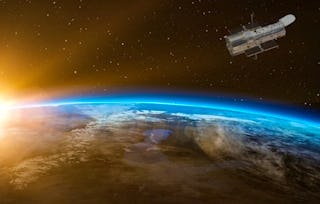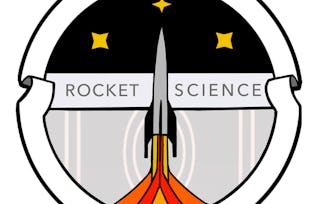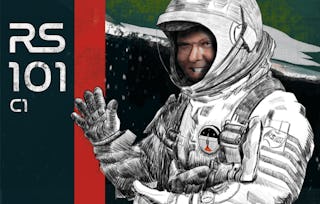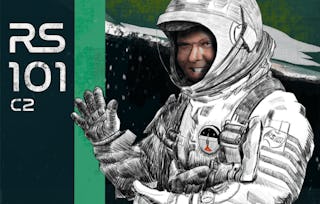We encounter the results of rocket science all the time; from weather prediction to GPS navigation, rocket science has helped navigate our world in new, innovative ways. Rocket Science in Everyday Life explores innovations in rocket science, including the formation of space agencies, like NASA and the European Space Agency, that work to advance rocket science. Learn how satellites are used to track climate changes across the globe and how rockets have taken us to worlds beyond our own. Examine the scientific motivations and methods for planetary exploration to see beyond our solar system. End the course with some cinematic magic and examine how movies and TV use rocket science to create exciting worlds - even if they don’t always get the science behind it right.

Ends soon: Gain next-level skills with Coursera Plus for $199 (regularly $399). Save now.

Rocket Science in Everyday Life
This course is part of Rocket Science 101 Specialization

Instructor: Aaron Ridley
Included with
(14 reviews)
Recommended experience
What you'll learn
Understand how different satellite systems help support our everyday life, such as weather and GPS satellites
Understand the difference between asteroids and comets, and describe the ramifications of different sizes of objects encountering the Earth
Describe how spaceships far away from the Earth can get places, what that should look like, and what forces the people on board would actually feel
Skills you'll gain
Details to know

Add to your LinkedIn profile
15 assignments
See how employees at top companies are mastering in-demand skills

Build your subject-matter expertise
- Learn new concepts from industry experts
- Gain a foundational understanding of a subject or tool
- Develop job-relevant skills with hands-on projects
- Earn a shareable career certificate

There are 4 modules in this course
Welcome to the first week of Rocket Science in Everyday Life! This week, we will learn about the science being conducted by NASA and other space agencies around the world. We will start by identifying these space agencies to recognize their general missions. Then, we will comprehend the structure of NASA and how it does science. Finally, we will identify NASA Earth science missions and comprehend the crucial role of Earth science satellites. Let's get started!
What's included
5 videos4 readings3 assignments1 discussion prompt
Welcome to the second week of Rocket Science in Everyday Life! This week, we will embark on a thrilling expedition through our solar system to understand the fascinating worlds beyond our planet Earth. We will learn about exploring planets in our solar system and beyond. Throughout this module, we will gain a comprehensive understanding of the scientific motivations and methods behind planetary exploration. Let's get started!
What's included
10 videos6 readings3 assignments
Welcome to the third week of Rocket Science in Everyday Life! This week, we will explore the science of transportation and bust some myths we learned from movies. We will distinguish between the imaginative creations of science fiction and the current state of scientific understanding and technological development. By examining what movies get right and wrong about transportation, we will foster a deeper understanding of the scientific principles at play and explore the potential future possibilities in transportation technology. Let's get started!
What's included
11 videos4 readings5 assignments
Welcome to the fourth and the last week of Rocket Science in Everyday Life! This week, we will explore the science of destruction in movies. We will start by exploring the impacts of asteroids and comets. Then, we will explore the science of preventing asteroids and comets from impacting Earth. By separating fact from fiction, you will gain a deeper appreciation for the real-world challenges and strategies involved in safeguarding our planet from potential impacts. Let's get started!
What's included
10 videos5 readings4 assignments
Earn a career certificate
Add this credential to your LinkedIn profile, resume, or CV. Share it on social media and in your performance review.
Instructor

Offered by
Explore more from Physics and Astronomy
 Status: Preview
Status: PreviewYale University
 Status: Free Trial
Status: Free TrialUniversity of Michigan
 Status: Free Trial
Status: Free TrialUniversity of Michigan
 Status: Free Trial
Status: Free TrialUniversity of Michigan
Why people choose Coursera for their career




Learner reviews
14 reviews
- 5 stars
100%
- 4 stars
0%
- 3 stars
0%
- 2 stars
0%
- 1 star
0%
Showing 3 of 14
Reviewed on Sep 2, 2024
Excellent timelines. I thought the course title could have been different.
Frequently asked questions
To access the course materials, assignments and to earn a Certificate, you will need to purchase the Certificate experience when you enroll in a course. You can try a Free Trial instead, or apply for Financial Aid. The course may offer 'Full Course, No Certificate' instead. This option lets you see all course materials, submit required assessments, and get a final grade. This also means that you will not be able to purchase a Certificate experience.
When you enroll in the course, you get access to all of the courses in the Specialization, and you earn a certificate when you complete the work. Your electronic Certificate will be added to your Accomplishments page - from there, you can print your Certificate or add it to your LinkedIn profile.
Yes. In select learning programs, you can apply for financial aid or a scholarship if you can’t afford the enrollment fee. If fin aid or scholarship is available for your learning program selection, you’ll find a link to apply on the description page.
More questions
Financial aid available,





